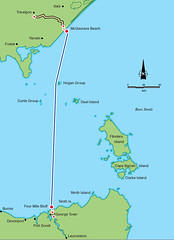The Rodent has finished his trip to Washington and received his latest set of instructions from Dick Cheney. He also spent a little bit of time trying to sell some natural gas - which should become and easier sell as time passes by and LNG terminals sprout like combustible mushrooms along the US coastline.
Back in our own backyard, there is some talk that Papua New Guinea may be looking at playing us off against China for access to their natural gas reserves, which outlines the somewhat annoying amount of distance between Australian population centres and our own natural gas reserves compared to those in PNG.
While PNG might have plenty of gas in the ground, available energy supplies there aren't all that plentiful at the present point in time, which has led one gold mining company to build its own geothermal powered plant.
Lihir chief executive Neil Swan said the new power station reduced Lihir's reliance on heavy fuel oil to generate power amid escalating world oil prices, with geothermal energy producing more than 60 per cent of power requirements. Mr Swan said the switch to geothermal energy was also good environmentally, as the naturally occurring geothermal steam would otherwise be discharged as waste.
The power station lifts Lihir's geothermal generation capacity to 36 megawatts, which includes output from a smaller 6MW plant that has been operating since 2003. Lihir said that total would increase to 56MW - virtually enough to meet all of its power requirements - when two new generators were added to the plant.
It not just PNG gas that China is after. According to the Herald, ("
Costello's nightmare: China eyes Woodside") they may think about trying to buy Woodside if the Unocal deal falls through.
The word on Wall Street is that the Chinese may be eyeing Australia.
As the $US18.5 billion takeover battle for American oil and gas group Unocal between a Chinese government-controlled company and the American Chevron Corp becomes increasingly politically charged, there are whispers among hedge funds that if the Chinese miss out, they'll switch focus to Australia's Woodside Petroleum.
And the prospect of the China National Offshore Oil Corp (CNOOC) making a tilt for Woodside would provide a big headache for Federal Treasurer Peter Costello. In 2001, a clearly embarrassed Mr Costello and the Foreign Investment Review Board turned down the bid for the rest of Woodside by Dutch-controlled Shell on the grounds of national interest.
More recently, the bid for WMC Resources by the Swiss controlled Xstrata passed muster - before before being topped by the Anglo-Australian BHP Billiton. But the Chinese controlling a major Australian energy producer could pose a more complex proposition. While Chinese demand has fuelled the Australian resources and sharemarket boom, CNOOC's bid for Unocal is seen by some as China seeking to shore up its own resources security.
While Smirky Pete might be having nightmares about having to block a Chinese bid for an Australian company, Ian McFarlane is dreaming about
doubling uranium exports, mostly to China.
China itself is bracing for an
energy crunch this summer, wih reports that businesses will be forced into week long staggered shutdowns. The Chinese have also come to regret opening up wildcat oil drilling in the provinces to private interests a while ago, and has since been performing sweeping
renationalisations of oil wells, much to the dismay of the owners.
Meanwhile, Morgan Stanlet's resident bear Steven Roach is
warning of a possible Chinese downturn and bursting of the oil "bubble".
Over in the UK, Rigzone has a
report about UK energy demand outstripping supply, and what that means for their current account deficit (Japan's trade surplus is also
suffering.
As the UK cannot produce enough oil and gas itself it has to import some. The UKOOA has warned that if the nation had to import enough oil and gas to meet all of its needs each year, the national economy would be around pounds -30bn a year worse off, increasing the current trade deficit by almost 75%.
Heading east, there is quite a bit of news from Russia, including a
report about a possible 30% hike in Russian gas prices for
drought stricken Western Europe, the
possibility of a Russian oil pipeline going through Turkey to southern Europe and a
report from the Jamaica Observer that Russia will be the world's largest oil producer this year.
Heading down to the Middle East, TomPaine has a good article called "
Oil control formula" about the battle for control of oil in the middle east and Caspian regions.
George W. Bush’s war in Iraq may not be going as planned. But for those who’ve stopped believing the myth that prewar Iraq represented any sort of threat to the United States, there is plenty of circumstantial evidence mounting that the real reason for the American invasion of Iraq was the most obvious one: Oil. In this case, “oil” doesn’t mean that we went to war for the commercial benefit of U.S. oil companies—and in fact, as I reported in Mother Jones magazine in early 2003, before the war, most U.S. oil firms and their executives were against the war. But in Iraq, “oil” means the strategic commodity that is the single most important world resource. Even a novice geostrategist knows that who controls oil controls the world. And in this case, America’s rival for control of oil is, first and foremost, China.
Seymour Hersh has returned with a new article in "The New Yorker" about US
interference in the Iraqi
election results (which George and the boys have had plenty of practice at).
Iraq and Iran have apparently signed a
military pact, which would suggest that the election rigging wasn't entirely successful. Why the Reuters report drops a gratuitous reference to Al Qaeda in the middle of the lead paragraph is a mystery to me.
Iraq signed a military pact with Iran on Wednesday in a breakthrough with a former foe, but al Qaeda said it would kill Egypt's kidnapped envoy and attack more diplomats to stop the government winning international support.
Defence Minister Saadoun al-Dulaimi signed a pact in Tehran agreeing to accept Iranian military training and other cooperation with the country Iraq fought for a decade under ousted leader Saddam Hussein. Responding to the suggestion that the thaw in ties with Iran would anger Washington, Dulaimi said: "Nobody can dictate to Iraq its relations with other countries."
The Times reports that Iraq is slipping into a "
civil war" (I'm sure you can imagine my standard cynical muttering about implementation of the Salvador option). As usual
Emmanuel Goldstein Abu Musab Al Zarqawi is being blamed.
TomDispatch recently had a dispatch on the mysterious "
Zarqawi Phenomenon" which goes over a lot of the background to this phantom menace.
As far as anyone can tell, Zarqawi's actual organization or network is, at best, modest in nature and no one writing about it or him even really knows whether the man is alive or dead, in or out of Iraq. A look at basic press accounts of Zarqawi finds them filled to the brim with words like "purportedly," "allegedly," "claims," and "the CIA believes with a high degree of confidence." And the unnamed sources who tell us what is supposedly known about Zarqawi are invariably anonymous "American officials" or "intelligence officials," the same people who once assured us that he had a leg amputated in one of Saddam's Baghdad hospitals. (He is now believed to be two-legged.)
How to put together this conveniently satanic figure -- capable of personalizing all the horrors of Iraq in a single monstrous body and bringing them home to the American public in a way that the Bush administration has found convenient -- with what little is known about a possibly not-too-bright small-town thug is a curious challenge. Independent journalist Dahr Jamail, who wrote for Tomdispatch (among other places) from Baghdad and then came home for a break, is now back in the Middle East and, from Amman, Jordan, he went on his own search for the truth behind the Zarqawi phenomenon
Finally, an interesting quote from The Herald that I missed last week, snuck in at the bottom of an
article on petrol refining problems at Caltex.
The chief executive of the Service Station Association, Ron Bowden, criticised the media's obsession with petrol prices. "People shouldn't be focused on how they can get it cheaper." He said they should instead worry more about the looming global oil shortage. "Our main focus is to supply enough fuel so the nation moves. What [motorists] pay for it isn't really important right now."






 A few other interesting posts at TreeHugger include an
A few other interesting posts at TreeHugger include an  That done, my thoughts turned to other classic British TV series - of which "
That done, my thoughts turned to other classic British TV series - of which "




 There are currently
There are currently 

 The Oil Drum has a
The Oil Drum has a 



